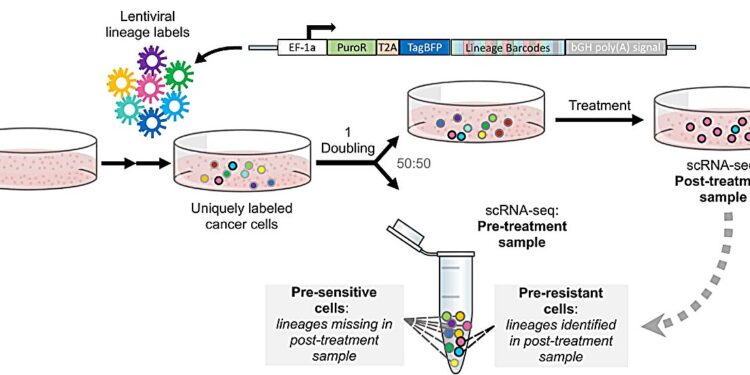Schematic representation of the ReSisTrace approach. Uniquely labeled cells are synchronized and allowed to divide once. Subsequently, the sample is divided into two for scRNA sequencing and processing. Then, the barcodes of cells recovered in the post-treatment sample are determined by scRNA-seq and used to identify pre-resistant cells in the pre-treatment sample. Credit: Nature Communications (2024). DOI: 10.1038/s41467-024-45478-7
In many cancers, such as ovarian cancer, each round of chemotherapy kills the majority of cancer cells, while a small population of them survives because of the treatment. These cells are generally more resistant to the next cycle of treatment and can thus grow back to form a deadly, treatment-resistant tumor.
In a recent study published in Natural communications, researchers at the University of Helsinki wanted to know how this small population of surviving cells differed from other, more sensitive cells already before treatment. To enable this cellular time travel, they developed ReSisTrace, a methodology that leverages the similarity of sister cells to trace pre-existing resistance to treatments in cancer.
Labeling cancer cells with genetic barcodes
“In ReSisTrace, we uniquely label cancer cells with genetic barcodes and allow them to divide once, so that we get two identical sister cells sharing the same barcode. We then analyze the expression of single-cell genes from half the cells before treatment, while treating the other half with chemotherapy or other cancer treatment. From the surviving cells, we can identify the barcodes of resistant cells.
“Using their sister cells analyzed before treatment, we can find out how cells that will survive through treatment differ from pre-susceptible cells, revealing pre-existing resistant states,” explains Jun Dai, a Ph.D. student in Anna Vähärautio’s group. , who developed the methodology for tracing sister cells.
The method has been applied to reveal cellular states resistant to chemotherapy, targeted therapy or innate immunity in high-grade serous ovarian cancer.
“We found that genes associated with proteostasis and mRNA surveillance are important in explaining pre-existing resistance to treatments. Interestingly, we found that DNA repair deficiency, very common in cancer of the ovary, sensitizes these cells not only to chemotherapy and PARP inhibitors, but also to NK kills,” says Shuyu Zheng, a Ph.D. student in Jing Tang’s group, who led the computational analysis.
Associate Professor Jing Tang’s lab then exploited the revealed changes in gene expression to predict small molecules that could switch cells from a resistant to a sensitive state.
“We developed a computational method to correlate resistant states with drug-induced gene expression changes. Ideally, if a drug can reverse the gene expression profiles of resistant cells, then it can be considered as a potential to overcome resistance,” says Associate Professor Jing Tang and team leader of the Systemic Oncology Research Program at the University of Helsinki.
The researchers found that most of the predicted small molecules actually changed the gene expression patterns of cancer cells toward sensitive states. More importantly, after the addition of these drugs, cancer cells were significantly more sensitive to carboplatin, PARP inhibitor, or NK killing, illustrating that the pre-resistance states identified by ReSisTrace were functionally relevant and targetable.
“Our new experimental and computational approach truly harnesses the power of single-cell omics and pharmacological data integration,” explains Associate Professor Jing Tang.
“The method we developed reveals the characteristics of cells that will, in the future, become resistant to anticancer treatments by coupling cell state and fate into sister cell resolution. It is widely applicable to identify and target cancer Pre-existing resistant cellular states across cancer types, as well as against different treatment modalities, including immunotherapies.
“Our approach paves the way for the development of sequential cancer therapies that can block resistance before it even appears,” concludes Anna Vähärautio, K. Albin Johansson Cancer Research Fellow, Finnish Institute Foundation of Cancer and Team Leader of the Systemic Oncology Research Program, University of Helsinki.
More information:
Jun Dai et al, Tracing resistance initiated in cancer via sister cells, Natural communications (2024). DOI: 10.1038/s41467-024-45478-7
Provided by the University of Helsinki
Quote: Sister cells discover pre-existing resistant states in cancer (February 12, 2024) retrieved February 12, 2024 from
This document is subject to copyright. Apart from fair use for private study or research purposes, no part may be reproduced without written permission. The content is provided for information only.



